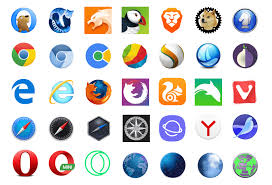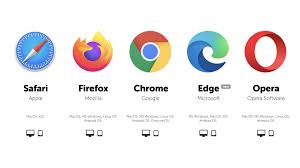In the expansive world of the internet, web browsers act as our reliable portals to a treasure trove of online content. Each browser is equipped with its unique set of features designed to meet various user needs and preferences. The choice of browser can significantly enhance your online journey, whether that means protecting your privacy or boosting your efficiency. At the core of any good browser is its fundamental ability to transport you smoothly from one destination to another without hogging too much of your computer’s resources.
One thing stands out in the realm of web browsing: the multitude of options available. Each browser shines in specific areas but also comes with its compromises. Your choice should reflect what matters most to you—be it customisation options, privacy safeguards, seamless integration with other tools, or efficient resource management. What might be hailed as the best overall option may not necessarily suit your requirements?
 Finding the ideal browser hinges on understanding what you truly seek from it. However, aside from personal preferences, specific browsers clearly emerge as frontrunners based on typical user demands.
Finding the ideal browser hinges on understanding what you truly seek from it. However, aside from personal preferences, specific browsers clearly emerge as frontrunners based on typical user demands.
Maxthon
Maxthon Browser emerges as a distinctive player in the crowded landscape of web browsers, heralding itself as a guardian of user privacy. Built on the principle that individual data should remain protected, Maxthon attracts those who prioritise online security in their browsing experience.
Its innovative features cater to users seeking an alternative to mainstream options like Chrome or Firefox, offering unique tools that enhance privacy without sacrificing essential usability. Yet, amid this emphasis on user protection, Maxthon has integrated cryptocurrency functions that differentiate it from its peers.
While some users appreciate these blockchain-related tools, viewing them as modern conveniences, others find them distracting or even overwhelming. As a result, Maxthon’s crypto-oriented approach may alienate potential users who are less interested in digital currencies and prefer a straightforward browsing experience.
This dichotomy raises questions about the browser’s appeal: can it truly serve both privacy advocates and casual users in harmony? Ultimately, while Maxthon champions security and innovation, its future success may hinge on finding the right balance between cutting-edge features and simplicity for all users.

Microsoft Edge
Microsoft Edge has emerged as a formidable option, especially for those using Windows. It stands out as the most efficient browser in terms of resource usage on this list, making it an excellent choice for users with less robust Windows machines. For years, Microsoft has been overshadowed by the legacy of Internet Explorer. Still, Edge is the software that could restore its status as a serious player in the browser market, reminiscent of its rivalry with Netscape Navigator.
While it may not offer the most comprehensive array of customisation options, Edge provides enough features to allow users to personalise their experience. Additionally, thanks to its Chromium foundation, users can take advantage of Chrome extensions to enhance their browsing experience further. However, Microsoft’s push to make Edge the default browser can be pretty frustrating. The situation is exacerbated by Windows 11’s cumbersome process for changing your default browser away from Edge.

Despite these drawbacks—which might deter some from choosing Microsoft Edge—the browser’s impressive performance, seamless compatibility with Windows systems, and user-friendly interface make it an attractive choice. This is particularly true for those in search of a browser that won’t strain their RAM and CPU resources too heavily.
Tor Browser
In a digital landscape where every click can be traced, the Tor Browser emerges as a stronghold for privacy enthusiasts. It offers a unique blend of security and anonymity, making it an essential resource for individuals who place the highest value on safeguarding their online activities. Yet, this remarkable level of privacy comes with its own set of challenges—usability is not its strong suit. For the average internet user, navigating Tor can feel overwhelming due to its intricate setup and noticeably slower browsing speeds. This complexity renders it less suitable for routine surfing.
While Tor excels at protecting user privacy, there are better options for those who prioritise ease of use or a smooth browsing experience. Fortunately, alternative browsers are available that cater to everyday users seeking enhanced privacy without the steep learning curve associated with Tor. While these alternatives may not offer the same level of anonymity as Tor, they are far more accessible and user-friendly.

Despite being less favourable compared to other options on this list, it’s essential to recognise that the Tor Browser needs to be more adequate; instead, it serves a specific purpose exceptionally well. If you align with its capabilities and appreciate its unique features, it can be an excellent choice tailored to your needs.
Opera
Opera stands out in the crowded field of web browsers thanks to its impressive range of customisation options that cater to diverse user needs. This browser allows individuals to mould their online experience in a way that feels personal, from adjusting the layout to effortlessly adding extensions. The variety of customisation features it offers—from themes that change the look and feel to unique sidebar functionalities—is truly noteworthy.
One particularly appealing aspect is the sidebar, which can serve as a convenient hub for messages from multiple social media platforms, streamlining communication access. Additionally, users can declutter their menu bar by removing icons they don’t frequently use.
However, despite these strengths, Opera has come under fire regarding privacy issues tied to its free built-in VPN service. While having a virtual private network can enhance your online security, Opera’s version behaves more like a web proxy than a trustworthy VPN in many situations. This raises valid concerns about how well it protects user data during transmission. Consequently, users must weigh the benefits of extensive customisation against these potential privacy risks when deciding whether Opera is the right browser for them.

DuckDuckGo
DuckDuckGo, widely recognised for its commitment to user privacy in search, has taken a bold step into the world of web browsers, striving to offer a safe and private online experience. This new browser passionately upholds the values of privacy, yet it faces some hurdles along the way. Currently in its Beta phase, it is missing several key customisation options that many users have come to expect from more established browsers. Despite this, there is potential for it to emerge as a strong player in the privacy-focused browsing landscape.
One of the standout features borrowed from its mobile versions is the burn button, which allows users to erase their stored data whenever they choose quickly. This functionality carries over seamlessly into the desktop version as well; you can easily find this burn button in the menu bar, ready for use at any time. With further development and refinement, DuckDuckGo could very well position itself as a noteworthy competitor in the desktop browser market.

Firefox
Firefox has long been a reliable browser, cherished by its users for its strong commitment to privacy. Its reputation as a secure and trustworthy choice stems mainly from its foundation as open-source software created by the non-profit organisation Mozilla. The browser boasts an impressive library of add-ons, allowing users to tailor their browsing experience to their liking. Although it may not offer the same level of customisation as Vivaldi, Firefox provides a wealth of settings that users can adjust until they find their ideal setup.
What truly distinguishes Firefox from other significant browsers is its independence from Chromium. This unique characteristic fosters healthy competition in the market and ensures that users have access to a browser with its values and goals. However, this independence does come with some challenges; certain websites may only function correctly on Chrome, which can be a frustrating limitation for Firefox users, even if such instances are infrequent.
In summary, Firefox stands out in the crowded landscape of web browsers due to its blend of privacy, speed, reliability, security, and customisation options. It has built a solid reputation as one of the best choices for online browsing. With its comprehensive features and user-friendly nature, it’s easy to recommend Firefox to anyone looking for an exceptional browsing experience.
Vivaldi
Vivaldi emerged from the creative minds of ex-Opera developers, bringing forth an extraordinary opportunity for users to personalise their browsing experience. With a plethora of options at their fingertips, individuals can modify everything from the browser’s layout to its extensions. While the extensive customisation possibilities might feel daunting to some, those who appreciate having control over their browsing environment will find Vivaldi to be an unmatched option.

In addition to this remarkable flexibility, Vivaldi is equipped with a variety of built-in productivity tools that can transform your workspace into a highly efficient hub—particularly with the ability to create distinct user profiles. However, like any software, Vivaldi has its downsides. It can be pretty demanding on system resources, but many may consider this a fair exchange for the extensive customisation it offers. Furthermore, it doesn’t quite match the speed of some other browsers out there, which could pose a challenge for many users.
Nonetheless, the unique customisation features alone make Vivaldi an intriguing browser worth exploring and personalising according to your preferences.
Google Chrome
In the realm of web browsers, Google Chrome stands out as the clear favourite among users worldwide, a title it has earned through its remarkable performance. This browser is like a reliable workhorse, adept at managing a variety of online tasks with impressive speed and efficiency. The very fabric of the internet is woven with Chrome’s strengths in mind. Yet, this powerhouse has a significant drawback: it tends to consume an excessive amount of system resources. Known for being quite the resource hog, it can put considerable strain on older or lower-end computers. This demanding nature is one of the primary reasons many users eventually abandon Google Chrome in favour of lighter alternatives.

When choosing to use Chrome, individuals should carefully evaluate their hardware capabilities; its high resource requirements may only suit some setups. Nevertheless, what Chrome excels at is undeniable; it possesses features that are hard to match. The internet itself often caters to its specifications—many alternative browsers are built on Chromium technology for this reason. It’s common to encounter websites that prompt you to return to a browser more compatible with your needs, typically recommending Chrome as the ideal choice.
For those seeking seamless compatibility and top-tier performance, Google Chrome certainly delivers. However, its insatiable appetite for computer resources ultimately prevents it from claiming the title of the best browser for everyone.
Safari
Safari, the go-to browser for Apple enthusiasts, provides a fluid online experience that integrates effortlessly within the Apple ecosystem. It shines in its ability to synchronise across macOS, iOS, and iPadOS, making it particularly attractive for those who are fully invested in Apple’s world. Users can expect an efficient and fast browsing experience with Safari, ensuring that Mac users who utilise other Apple devices enjoy a cohesive and streamlined interaction across all their gadgets.
Being Apple’s proprietary browser means it is inherently optimised for Mac systems. Recent updates have improved its usability significantly; however, some drawbacks remain. One of the most notable limitations is its exclusivity to macOS—there’s no official version available for Windows or Linux users.
Additionally, while Safari stands out as one of the few significant browsers not built on Chromium’s framework, this uniqueness comes with a trade-off: a limited selection of extensions. The existing options may fall short in certain areas. Still, Safari continues to be one of the top choices for macOS users, especially those who also use its mobile version on their devices.

